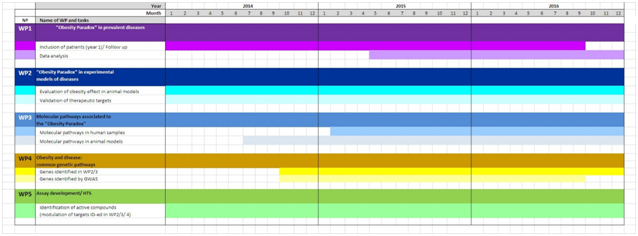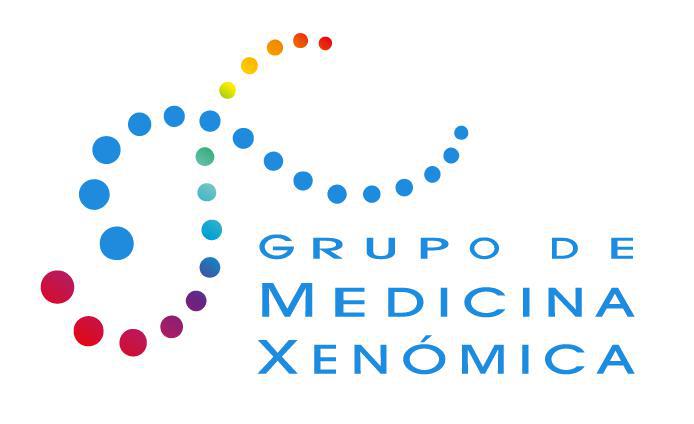| Project coordinator (PC): Castillo Sánchez, José | Code: PI13/00024 | |
| Call: Acción Estratégica en Salud 2013 (AES2013) – Instituto de Salud Carlos III (ISCIII). Ministerio de Economía y Competitividad (MINECO) | ||
| Budget: 605.000,00€ | Starting date: 01/01/2014 | Term: 3 years |
| Project abstract:It is well described that obesity and low body weight has a negative influence on survival in normal subjects. Above or below an “optimal” body mass, a person’s lifespan decreases. Likewise, elevated body-mass index may increase a person’s susceptibility to prevalent diseases such as stroke, heart failure (HF), rheumatoid arthritis (RA), and breast or colorectal cancer (CRC). However, not all published studies agree on these findings. Moreover, it has been suggested that obesity may improve the prognosis of those patients who suffered these prevalent diseases. This controversy is known as the «Obesity Paradox». Since today, obesity is a major health problem in Spain and developed countries, it is necessary to develop a therapeutic strategy that allows physicians to care more efficiently to these patients. Therefore, the main goal of this project is to evaluate the impact of lean mass index (LMI) and body fat (BF) (obesity parameters) in a cohort of patients with stroke, heart failure, RA, and breast/colorectal cancer during a follow-up period of 21 months in order to design a therapeutic strategy for “Obesity Paradox” associated to these prevalent diseases.
To achieve our goal we have developed a specific and translational work plan which will be conducted by multidisciplinary groups, belonging to different areas of knowledge of the Health Research Institute of Santiago de Compostela (IDIS). The foreseeable impact of the project is 1/ development of new clinical practice guidelines for obesity management associated to multiple prevalent diseases (stroke, heart failure, RA, and breast/colorectal cancer); 2/ Improvement of the effectiveness of technology use in prevention and care of obesity associated to these multiple prevalent diseases; 3/ Identification of new pathways and/or molecular targets for the development of biomarkers and clinical trials for treat obesity associated to the mentioned diseases. Key Words: “Obesity Paradox”, lean mass index (LMI), body fat (BF), multiple prevalent diseases (Reumatoid Arthritis, Heart Failure, Breast and Colorectal Cancer), lifespan, prevention and care, therapeutic strategy, multidisciplinar, molecular pahways, therapeutic targets, genes, genome-wide-association-studies (GWAS), biomarkers, animal models of disease, clinical trials. |
||
TEAM (*)
| Surname | Name | Title/ Position | Entity | |||
| Castillo | José | Neurology, MD/ PC | University Clinical Hospital of Santiago de Compostela (CHUS) | |||
| Carracedo | Angel | Head of CeGen, PhD / PI | CEGEN | |||
| Gago Domínguez | Manuela | Researcher, PhD | FPGMX | |||
| Torres Español | María | Responsible of Sequenom Platform, PhD | CEGEN | |||
| Sobrino Rey | Beatriz | Responsible of Sequencing Platforms, PhD | USC | |||
| Barros Angueira | Francisco | Head of Laboratory, PhD | USC | |||
| Carracedo | Ángel | Galician Public Foundation of Genomic Medicine (FPGMX) | ||||
| Casanueva | Felipe | Endocrinology, MD/ PI | University Clinical Hospital of Santiago de Compostela (CHUS) | |||
| González-Juanatey | José R. | Cardiology, MD/ PI | University Clinical Hospital of Santiago de Compostela (CHUS) | |||
| Gualillo | Oreste | Rheumatology and Inflammatory Diseases, MD/ PI | University Clinical Hospital of Santiago de Compostela (CHUS) | |||
| López | Miguel | Phisiology, MD/ PI | University of Santiago de Compostela (USC) | |||
| López-López | Rafael | Oncology, MD/ PI | University Clinical Hospital of Santiago de Compostela (CHUS) | |||
| Loza | Mabel | Pharmacology, PhD/ PI | Center for Research in Molecular Medicine and Chronic Diseases (CIMUS) | |||
| PC: Project Coordinator | PI: Principal Investigator | |||||
(*) Para una mayor brevedad y la concisión, sólo se listan los miembros del «Grupo de Medicina Xenómica» y los Investigadores Principales (PI) de las diferentes entidades involucradas se han enumerado. PC: Coordinador del proyecto.
ENTIDADES PARTICIPANTES Y COLABORADORAS
| Nombre | Siglas | Tipo/ Categoría |
| Instituto de Investigacion Sanitaria de Santiago | IDIS | Public body |
| Fundación Pública Galega de Medicina Xenómica | FPGMX | Public body |
| Center for Research in Molecular Medicine and Chronic Diseases | CIMUS | Public body |
| Servizo Galego de Saúde | SERGAS | Public body |
Objectives.
The main goal of this project is to evaluate the impact of lean mass index (LMI) and body fat (BF) (obesity parameters) in a cohort of patients with stroke, heart failure, RA, and breast/colorectal cancer during a follow-up period of 21 months in order to design a therapeutic strategy for obesity paradox associated to these prevalent diseases.
Specific objectives of the project are the following:
To evaluate the impact of obesity in multiple prevalent diseases such as stroke, heart failure, RA, and breast/colorectal cancer in order to design a therapeutic strategy for management of obesity in these prevalent diseases.
To evaluate the paradoxical effect of obesity in experimental models of obesity subjected to stroke, myocardial infarction, RA associated to cachexia and advance stage metastatic disease in order to identify pathways and validate therapeutic targets.
To identify novel molecular targets associated to the paradoxical effect of obesity on these prevalent diseases.
To assess the independent and interactive roles of genes identified from novel molecular pathways and genome-wide association studies (GWAS) involved in metabolic traits of obesity on stroke, heart failure, RA, and breast/colorectal cancer (figure 1).
To identify active compounds, which modulate a particular biomolecular pathway involved in metabolic traits of obesity on stroke, heart failure, RA, and breast/colorectal cancer.
Work Plan and cronogram.
A specific and translational work plan wasenvisaged, in order to achieve afore mentioned objectives. The projectwasorganized in 5 different work packages (WPs), one per specific objective, all correlated to each other but which can be developed in an independent way. The work is been conducted by multidisciplinary research groups of the Health Research Institute of Santiago deCompostela (IDIS), with extensive expertise in the research fields of this proposal.

The list of activities (WP and sub- WP) in figure 2 have been scheduled as shown in the cronogram below:

Figure 3
Current status.
Project ison- going.
Derived publications
NA





